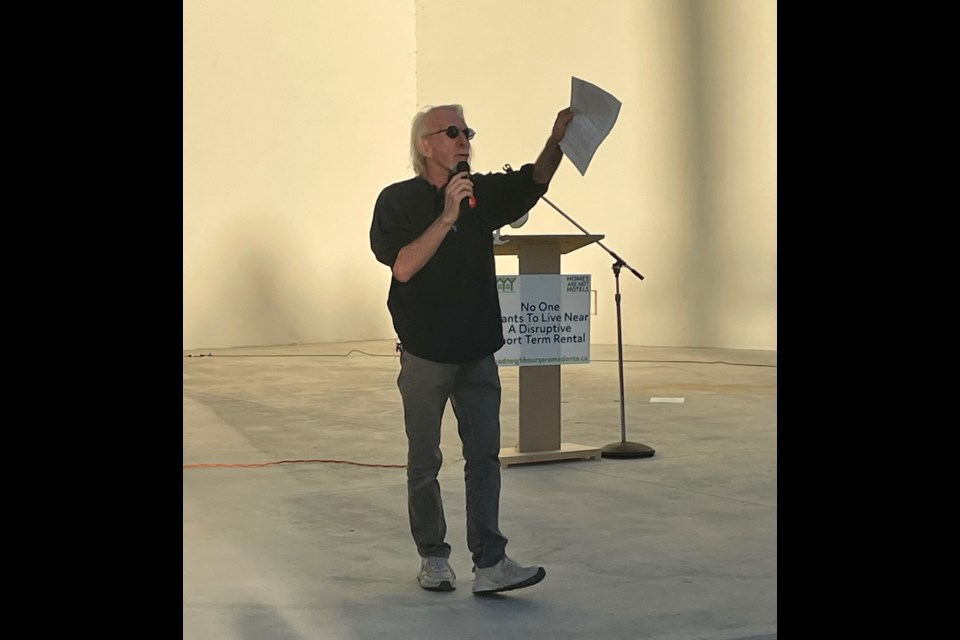With short-term rentals (STRs) causing persistent issues in numerous communities, the Oro-Medonte Good Neighbours Alliance hosted a public information session this week at the Rotary Aqua Theatre in Orillia.
More than 100 people gathered to share concerns and listen to speakers from across Simcoe County and Muskoka.
Among the speakers were former professors, town planners, ratepayers association presidents, and concerned citizens, who shared their experiences with STRs, discussed their legality, and expressed frustration with the response from municipalities.
Oro-Medonte resident Gene Stein highlighted numerous issues he has experienced in the township’s Maplewood neighbourhood.
“We’ve had stags, we’ve had stagettes, we’ve had strippers, we’ve had strippers with happy endings, we’ve had intoxication, we’ve had fights, we’ve had police calls; we’ve had it all,” said Stein, who is president of the Maplewood Ratepayers Association.
“The greatest one was Virgin Radio in Toronto hosted a contest (to) win a weekend at the cottage. That was great — they brought a DJ, too. You cannot reason with these people.”
Stein said there has been a lack of support from local officials in dealing with problematic STRs.
“If Oro-Medonte bylaw even answers, they come out, they look, they’re out-gunned, they leave,” he said. “God bless the OPP, but they have limited jurisdiction in these matters. They can enter the property, they can make a noise complaint, but unless something really shady is going on, they have no jurisdiction.”
STR homes are purposely developed to allow more than a dozen guests at a time, Stein said, noting the neighbourhood’s waste system is not designed to handle such volumes.
University of Toronto professor Kim Pressnail, an Oro-Medonte resident, questioned the legality of STRs and said not one has been shut down in the township.
“Our township staff and legal counsel told us at the recent (Ontario Land Tribunal) hearing short-term rentals are not permitted in residential zones and have been prohibited since 1997. They’re illegal,” he said. “Since 2017, despite hundreds of calls for help, not one short-term rental operator has been brought before the courts and shut down — not one.”
Similarly, Tony Mintoff, a former Tiny Township councillor who resigned in 2021, questioned the legality of STRs.
“Throughout the province, short-term rentals or any form of temporary accommodation are not a permitted use in shoreline residential neighbourhoods in Tiny Township. They are commercial entities, full stop,” he said.
“That’s just not my interpretation of the law; it’s an opinion also shared by the Ontario Land Tribunal, who have ruled on the matter numerous times, and they have determined that in every instance, STR operations are commercial in nature and are not compatible with the intended purpose or design of residential neighbourhoods.”
Mintoff said Tiny Township has repeatedly disregarded the concerns of residents.
“When this matter first came before council in 2019, planning and bylaw staff downplayed the issue of STRS in the community as almost a matter of housekeeping,” he said.
“I pushed for the immediate institution of new controls to rein in STRs and provide residents with some sort of relief from what many have described to me as a nightmare, a total loss of the quality of life.”
He said fellow councillors “were unsympathetic to the plight of many residents suffering at the hands of short-term rentals.
“Upon further investigation, I was horrified to learn that these operations were, in fact, in the illegal use of land under the current zoning bylaw, and always have been — a fact that Tiny planning and its consultant refused to advise council of or even acknowledge.”
Several speakers asked residents to call on local officials to address the STR issue.
Several members of Oro-Medonte council were in attendance at Wednesday’s session, where they distributed information sheets outlining the township’s actions on STRs over the years.
The information sheet stated a zone was established in the Horseshoe Valley area in 2014, permitting STRs in that area, and that only those STRs and others established prior to a 1997 bylaw may continue to legally operate.
In 2018, the township passed an interim control bylaw to address unpermitted STRs and, in 2020, it retained Host Compliance to assist with identifying STR properties.
“Municipal bylaw staff inspected these properties and issued warning letters, resulting in a number of STRs ceasing their operations and charges being laid,” the information sheet stated.
In 2020, the township adopted a bylaw clearly defining an STR as a commercial activity, providing clarity “with respect to the existing prohibition on commercial accommodations in dwelling units.”
However, the bylaw was appealed to the Ontario Land Tribunal and, in March 2022, the appeal was upheld, meaning “the amended definition clarifying STRs as being commercial was not upheld.”
The township filed a notice of motion to appeal the tribunal’s decision, pending receipt and review of its written decision, which it has not yet received.
A draft licensing bylaw was considered by council in June that would have granted additional enforcement tools regarding legally operating STRs, but it did not go forward.
“Based on previous demands for increased enforcement, and with further input from the public, council remains willing to revisit the staff report regarding licensing,” the information sheet stated.



